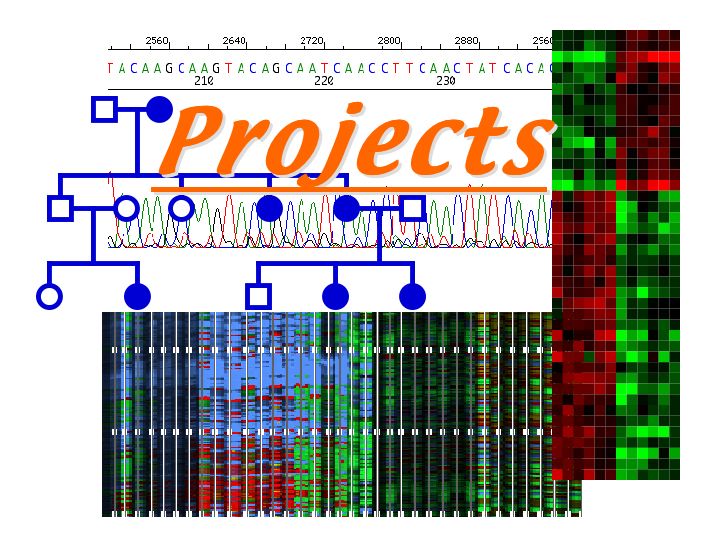We apply advanced genetic and genomics technologies to study complex, common human conditions. Our primary areas of interest are breast and ovarian cancers, neurogenetic disorders such as schizophrenia, inherited deafness, systemic lupus erythematosus, as well as the identification of victims of human rights abuses. We have collaborators from many parts of the world. Our goal is to contribute to the well being of the human race.
As you browse through the pages about our projects and members, you will learn more about the specific research activities we are undertaking.
Breast and ovarian cancers
Genetic studies of human breast cancer has proven to be an effective approach to understanding, and eventually preventing and curing this disease. Our lab has devoted more than 30 years in breast cancer research. In 1990, we showed that a subset of familial breast cancer was caused by a major gene, BRCA1, thereby starting a new era in cancer genetics research. Today, our research on breast and ovarian tumorigenesis takes a variety of approaches.
We continue search for mutations of BRCA1, BRCA2, and other genes related to breast/ovarian cancer in "mystery families", whose genetic mutations leading to cancer susceptibility have not been found. We also use cohorts of independent breast/ovarian cancer patients to conduct genetic epidemiological studies. Since the onset of breast/ovarian cancer is subject to factors in addition to inherited genetic predisposition, we are investigating the possible contributions of modifier genes, as well as environmental and life style factors that may influence the penetrance of BRCA1 and BRCA2 mutations.
Using molecular and cellular biology techniques, we are studying the expression and functions of BRCA1 and BRCA2 with various designs. Through studies of genetic alterations and expression characteristics in tumor tissues, we are performing extensive research on the clinical applications of genetic technologies to the diagnosis and treatment of cancer patients.
Inherited deafness
Deafness is a common trait in a large percentage of the population. Genetic changes are known to be a significant component in this condition. Our lab has focused on genetic approaches to understanding the underlying causes of hearing loss and deafness. Since 1990, in collaboration with scientists from various regions of the world, we have mapped and cloned several genes conferring susceptibility to deafness and hearing loss, and addressed the complex genetic basis of hearing loss in specific populations. Currently, in collaboration with Dr. Karen Avaraham of Tel Aviv University and Dr. Moien Kanaan of Bethlehem University, we have established collaborative research projects to identify new genes in the Middle East. Using technology such as transgenic mice, we are investigating the biological functions of the cloned genes pertaining to hearing loss.
Schizophrenia
Schizophrenia is a common trait around the world. Epidemiological and biological studies show that there is a significant genetic component in this highly complex trait. In collaboration with researchers from within the UW and other institutes, and using advanced genomics technologies, we have shown that this trait is highly correlated with individually rare mutations in different genes in a group of patients. We are working on advancing our knowledge about this trait by actively engaging in additional genomic studies with the latest technologies.
Systemic lupus erythematosus
Many studies have suggested that SLE, an autoimmune disease with a wide spectrum of clinical and immunological abnormalities, has a strong genetic background. Several chromosomal regions have been reported to show considerable linkage to SLE. In our project, we select candidate genes from regions with strong linkage and sequence them for SLE patients to identify genetic variants. Expression patterns of select candidate genes between patients and contorls are also investigated. We will also identify single nucleotide polymorphisms (SNPs) to perform linkage disequilibrium analysis with haplotype-tagging SNPs. Identification of the sequence variants and SNPs will enable us to elucidate genetic changes associated with susceptibility to SLE.
Human rights and identification
Since 1984 our laboratory in collaboration with the Abuelas de Plaza de Mayo in Argentina has analyzed cases of human rights violations using genetic technologies to reunite kidnapped children with their biological families. We work with human rights organizations to identify missing persons in other countries including Guatemala, El Salvador, Honduras, Haiti, Rwanda, the Balkans, Mexico, and the Phillipines. We are also interested in developing new methodology for this application.
Next gen sequencing
Technological advancements have enormously helped accelerate scientific research, notably in genomic research in recent years. Since 2009, we have established our next generation sequencing facility, currently employing the HiSeq2000 platform developed by Illumina Inc. Through clever employment of available technology and our in-house developed applications, we are successfully and cost-effectively applying next gen sequencing technology to gene identification projects to phenotypes including schizophrenia, breast and ovarian cancer, inherited deafness, Perault's syndrome, and others. We have also worked with collaborating research groups to successfully develop genomic research applications specific to their objectives.
Bioinformatics
Interpreting and understanding biological information is an integral part of biomedical research. As vital parts of our research, we are actively developing techniques for analyzing genetic, biological, and clinical data in various aspects, with applications that are designed for projects in our lab, but can also be employed for general use in similar studies.
We have extensive experience in the identification of susceptibility loci for complex traits through linkage analysis. We are continuing with the application of linkage mapping techniques in gene identification. In conjunction with earlier positional cloning efforts, we developed a computer program, SeqHelp, to facilitate efficient molecular sequence analysis. As sequencing technology is being widely employed in our research, we are developing techniques to facilitate the identification of sequence variations for a variety of applications. In conjunction with other software, we are using a variant of SeqHelp to help identify variants in our resequencing projects, which include identification of disease-associated variations, genetic polymorphisms, and human identification. As we constantly evaluate and employ new technologies for genome and genetic research, we also actively identify and develop methods for analyzing high-throughput genomic and genetic data.
Other projects
The advance of genomic technology in recent years has significantly enhanced biomedical research, where researchers have brought a great amount of insight into the underlying fundamentals of many previously difficult to understand biological conditions. Our expertise and experience from decades of genetic and genomic research in complex diseases position us well in exploring the application of genomic knowledge and technology to look for answers in other complex traits. Collaboration with other researchers is always a beneficial approach to contribute to human well being. Such collaborations, along with the support of participants in all aspects of our research, are an integral part of our scientific pursuit.
We would like to thank our study participants, funding agencies, collaborators, and everyone who has supported our endeavors.
We hope that you now have a better understanding of our work. Please visit us again.



